- Home
- Trevor Scott
Cantina Valley (A Ben Adler Mystery Book 1) Page 9
Cantina Valley (A Ben Adler Mystery Book 1) Read online
Page 9
“True. I’m taking care of the IRS. I’m trading my investigative skills to that Portland lawyer for her getting them to take a hike.”
Jim laughed. “They’ll probably want a cut of that. But you said you found this McGuffin fellow, right?”
“Sort of. But I’ll still want to talk with the man.” Now, the real reason he had come to talk with his neighbor. “Before I go, what can you tell me about my father and his short wave radio?”
“What do you want to know?” Jim asked. “We all used to use them to communicate back in the day.”
“Just after the carrier pigeon?”
“I always told your daddy he didn’t whip your ass enough.”
It had been enough. “Did you ever run across anything strange?”
Jim laughed out loud. “Are you kidding me, Ben. The Ham radio is run by some of the craziest people in America. The world, actually. The government tried to shut down the whole shebang many times. But the Ham guys were like whack a mole. They’d keep reinventing themselves and shifting frequencies faster than some change their underwear. It was like the old west. I don’t know how many still use the short wave. Mine is collecting dust in the garage. Why do you ask?”
“Just curious. I found my dad’s setup and started listening in.”
“I thought you were totally off the grid.”
“I am. For the most part.”
“You know the NSA can track short wave,” Jim said.
“I know.” And Ben guessed those on the radio this morning also knew this, which is why they were speaking in code.
As Ben got up to go, Jim stopped him and said, “One thing I just remembered. I hear Marlon Telford has become the biggest supplier of truffles in Oregon.”
“Truffles?”
“Yeah, the subterranean type, not the chocolates.”
“Good money in that.”
“Right. And Oregon has a ton of them. The rich get richer.”
Ben nodded agreement. Changing the subject, he said, “Have you heard anything about the man you found dead on your property?”
“Not since I gave my last statement. Why?”
“I don’t know. Finding a man shot in the back of the head might be common in New Jersey, but not in Cantina Valley.”
“You got that right,” Jim said. “Lester is a good man. He’ll get to the bottom of it.”
“He’s not even a detective,” Ben said. “I wonder if the sheriff would have assigned him the case if the victim had been a white man. Or a woman.”
“You think this might be a race thing?” Jim asked.
Shrugging, Ben said, “I hope not.”
The two of them exchanged a heavy gaze.
Finally, Ben said, “I better get going. My chain saw is itching for some action.”
Ben left his neighbor and drove home, knowing he had an afternoon of tree cutting ahead of him. The heavy ice had taken more than a few limbs and full trees, he guessed. But as he drove home, he wondered about his conversation with Jim Erickson. The two of them were more alike than Ben would admit, but their differences in philosophy were as wide as the Cantina Valley.
15
Tavis McGuffin woke early like he had during his days in the Army. Not so much unlike those days, he awoke in a tent. But this one was a canvas hunting camp tent with a small wood stove. He had been awake on and off with the sounds of rain pounding the canvas, and the snapping of branches and trees falling all around their camp. At least it wasn’t as bad as early Sunday morning, where a tree fell and nearly hit his tent. Then they had spent much of Sunday cutting away trees that had fallen over the road to their camp instead of actually picking mushrooms. That put them behind by half a day.
He took off his black wool cap and scratched his short hair, before pulling it back over his head. Then he put on the same pants he had worn for the past two days. Hopefully he would be able to come down out of the Siuslaw for a shower and new clothes soon. But now, as he had been in the military, he was dependent on someone else for his ride.
The small group of men had gone up into the mountains of the Oregon Coast Range to collect their share of the commercial mushroom trade allowed by the government. They would probably reach the weight limit by noon, Tavis guessed.
As he put on his rain gear over his old camo uniform, he thought about his sister, Maggi. He should have told her where he was going and what he was doing. But Kevin had his orders from higher up. None of them were to give up their location. Mushroom picking grounds were classified Top Secret by those in charge—those with the most to lose by divulging that information. The worst of all were the truffle hunters, though. Those guys would pull a gun on someone over a coveted area of the forest, even if that location was on public land.
The Siuslaw National Forest was one of those places where anyone with a proper permit could hunt. At over 630,000 acres, the forest stretched from the Pacific Ocean to the Willamette Valley, in parts of eight Oregon counties. Tavis thought the forest was some of the most inhospitable tangle he had ever encountered in any mountain range. Luckily they used maps, compass and GPS to keep from losing their position, or their faith.
The flap opened and their team leader entered. Moose Harris (nobody knew his real given name) smiled with half of his mouth. The other half held about two inches of a cigar, a regular feature on his pock-marked face. Moose had to be an ironic name, since the former sailor was about five four and two hundred pounds. But most of that excess weight was muscle at least. Like all good chief petty officers, he walked with a swagger from either enduring heavy seas most of his adult life, or from the importance of his position in the Navy. The chiefs ran the Navy.
“Guff is finally awake,” Moose said. “Now we can get to work. The Army must have worked banker’s hours.”
Tavis checked his watch. “It’s zero six o five. And while you were safely in your rack on a ship, we were sleeping in the desert fighting off spiders the size of cats and dodging bullets.”
“Hey, just busting balls, Guff.”
“What’s for breakfast?”
“Bacon and eggs. Coffee is almost ready.”
“Beats the hell out of MREs.”
“You got that shit right.”
“When do you guess we’ll get out of here?” Tavis asked.
Moose drew in hard on his cigar, bringing the tip to a bright red. Then he said, “I’m guessing by eleven twenty-five. We should draw a pool and bet on that.”
The former chief would bet on who would take a crap first in the morning.
“No frickin’ way. Some of the guys will slow down to meet their times. And I need a shower.”
“Yeah, you do.”
“That’s what happens when you work for a living.”
Moose feigned disgust. But he changed directions. “We’ll break camp, get back down to the valley Compound, and turn around to a new location tomorrow.”
“What? Once we meet our quota, we’re done.”
Moose laughed. “With Matsutake. We’re going to truffle camp next.”
Tavis shook his head. “Those guys are assholes.”
“Preachin’ to the choir, Guff. But that’s where the real money is in this game.”
Truffle hunting was back breaking work, Tavis thought. He had spent two days in that camp two weeks ago, and that was bad enough. “They think they shit truffles, Moose.”
“Funny you should say that. Last time we were hunting white truffles, but now they’re going after the black ones. They say the French and Italians had a good crop of whites, but the blacks are in high demand this year, boosting the price to thousands per pound.”
“That’s all great, but they treat the truffle dogs like royalty.”
“I know. But without the dogs, we’d be running around the forest blind. They save a lot of time.”
Great. Tavis knew this wouldn’t be an easy transition from the Army back into civilian life. He had decided to take some time off until starting college in a year on the G.I. Bill. Now
he thought about how nice it would be sitting in a warm classroom checking out all the young women at Oregon State. Hard work did one thing, though. It gave him incentive to study hard once he got to OSU. Now he just needed to know what he planned to study. Well, rummaging underground for expensive fungi would give him plenty of time to think, he guessed.
“Coffee should be ready by now,” Tavis said. “Let’s get some.”
They finally got to their mushroom weight limit around 1000, broke down their camp in a half hour, and drove down the mountain in another hour.
•
Maggi McGuffin spent all Monday morning in union contract negotiations with the hospital representatives and nursing union reps. At noon they took an hour lunch break, and it was now ten minutes before they were scheduled to get back to the grind.
Standing out in an isolated corridor near the administration conference room, she checked her phone for any possible messages from her brother or maybe a missed call from Ben, when her phone suddenly buzzed in her hand. She was surprised to see her brother’s face appear.
She quickly answered. “Tavis. Where have you been?”
“I’m sorry, Maggi,” Tavis said. “I’ve been working up in the Coast Range, picking mushrooms. There’s no cell service.”
“I haven’t heard from you in a month,” she said, almost in tears.
“I’m sorry,” he repeated. “Kevin said you came to the place where I’m staying. How did you find me?”
“That’s not important. What are you doing there?”
“Like I said, working. Don’t get on my case.”
“I worry about you.”
“I know. But you don’t have to, Maggi.”
She hesitated when she saw the hospital HR director round the corner and point at his watch. In return, she put one finger up.
Maggi continued, “The locals in the area call that place the Compound. It has quite a history.”
“I know nothing about that. What are you getting at?”
“Are you in trouble?” she asked.
“Of course not. Where is this coming from?”
“I don’t know. I’ve just got a feeling. The same feeling came over me when you were deployed. When. . .”
“When I was shot.”
“Right.”
“The most that can happen to me hunting mushrooms is getting a bad case of trench foot.”
“What if I drive down there?” she asked. “I’ll buy you dinner.”
“Don’t waste your time. I have to leave again in the morning. This time we’re hunting truffles.”
“I’ve never tried those.”
“Nobody has. Unless you’re rich. I could sneak a piece out for you if you’d like.”
“Don’t get in trouble, Tavis.”
“I’m fine. I’ll call you when I get back out of the mountains.”
“All right. I’ve got to get back to work.”
They both hung up and Maggi stared at her phone. She had to admit that her brother sounded all right. Maybe this was what he needed before starting college in the fall. He had been restless after his discharge from the Army. The HR director poked his head out into the hall again and smiled at her. The man had very little patience, and would have had even less if he didn’t want to sleep with her—despite his marital status. He had made that all too clear a month ago.
She put her phone back in her purse and went back into the conference room.
16
Ben spent most of Monday finishing cutting down trees that had been damaged in the weekend ice storm. Those he could keep for firewood he stacked in piles around his property. While he worked, he couldn’t get his mind off of Maggi McGuffin and her brother Tavis. Earlier in the morning he had driven down the hill far enough to get cell service, calling a couple of old Air Force friends. Isolation was great for the soul, but Ben was used to having investigative technology at his fingertips. Maybe he needed to consider at least getting internet access.
Now, nearing darkness, he drove back down the hill and pulled his truck onto a patch of dirt, an entrance to one of his neighbor’s fields.
First he called a special agent in Air Force OSI who had worked for him just before he retired. He was asking a lot of his old friend.
His friend Tom answered his private phone with a simple, “Yeah.”
They were both smart enough to speak in generalities as much as possible so their friends at the NSA wouldn’t flag their conversation—despite the fact that they were both using disposable cell phones.
“Hey. How the hell are they hanging?”
“Just wonderful. Your Bigfoot friend is loaded. The purchase was over a billion. He paid five hundred mil in taxes on that.”
“When was that?”
“A couple years ago. Last year he made millions in interest and dividends. But here’s the interesting stuff. The guy shows income close to a million dollars from a company that exports mushrooms and truffles.”
“That’s a lot of fungi.”
His friend laughed. “Yeah, two or three truffles maybe. Oh, he does own an island in Belize. He has an undisclosed amount of money in a bank there as well. But I wasn’t able to access that data. Belize is more secret than most tax haven countries.”
“What about the other guy?” Ben asked, meaning Kevin Engel from the Compound.
“Outstanding military service record with the Army. Retired now. His direct deposit goes to a checking account. The address they have for him is what you call the Compound.”
“Anything jump out on the guy?”
“Yeah. Much of his service record is still classified.”
So was Ben’s, but that could mean a lot of things.
“What about my lawyer friend?” Ben asked.
“Okay. Almost nothing on social media. If you had a damn computer you’d know this. But I did find a number of photos of her online. She’s quite the looker. Are you sure this is strictly professional.”
“So far. Anything strange?”
“Not really. She went to Oregon State for her undergrad and then Lewis and Clark for her law degree. Finished near the top of her class there. After becoming an attorney, she’s worked for the same law firm in Portland. Did you know she was married?”
“Yes. Five years.”
“You know you could get most of this info over a couple of dates.”
“Her background is not that important,” Ben said. “I just like to know who I’m working with.”
They both paused and finally his old friend asked, “How is life after the service?”
“Still working that out. I have to tear myself down each morning to realize I no longer have an important purpose in life.”
“Now you’re just depressing me.”
“It’s a simple life.”
“Well, boss, I think you need to find a good woman.”
“I thought I’d try to find a good me first.”
“Sounds good. If there’s anything else you need, give me a call. And get a real phone. As you know, I can encrypt our conversations.”
“I’ll think about it. Thanks.”
They both hung up.
From memory, Ben called another number. This was a woman he had worked with years ago. An Air Force linguist who was now assigned to the NSA.
“Wow,” she said. “Two calls in two days. That’s a record.”
“Sorry about that. But I told you I’ve been off the grid since my retirement.”
“I’ll say. You need to get a real phone and the internet.”
“Another old Air Force friend just told me the same thing.”
“Old? I’m five years younger than you.”
“Old as in long-time.”
“I see.” She paused, perhaps wondering what she could tell him. Almost everything the NSA did was highly classified. Finally, she said, “You know the game, Ben. What specifically do you need to know?”
Need to know was more important than security clearances. “Anything I should know abo
ut the two names I gave you yesterday?”
“I cannot confirm or deny anything,” she said. “Okay, that’s not entirely true. I’ve got this conversation routed through six foreign countries on a constant shifting loop. We could discuss Roswell if you’d like.”
That was a dig at both of their jobs at one point in Air Force OSI, where they had been charged with debriefing pilots who had experienced strange phenomena. They had never exchanged their various debriefings on UFOs. Back then they had been more than a little speculative on the subject. But with the total number of independent accounts, perhaps there was more to these stories than either of them really wanted to admit. Although lie detector tests were not admissible in court, it didn’t mean they were not correct. And every one he had administered to these pilots had shown they were telling the truth. Ben guessed the Pentagon would never declassify their work. They would have to take this knowledge to the grave.
“What about the short wave radios?” Ben asked.
“Any data we might collect from those, and I’m not saying we collect anything, would be transferred to the FBI. Unless it involves foreign sources, which would be the only way we could get involved in the first place. Those would theoretically go to the Agency and Defense.”
“That’s a whole lot of equivocation.”
“That’s how we roll, Ben.”
“Roger that.” He thought how to ask his next question. “So, I’m guessing you have nothing to report.”
“Say again.”
“Any active investigations in my area?”
Silence.
“I understand,” Ben said. “Thanks for your help. On another note, how’s your husband and two kids?”
“The kids are great. My ex is lucky he still has Air Force dental.”
“Don’t tell me he was stupid enough to cheat.”
His friend at the NSA was a black belt in two different forms of martial arts.
“He isn’t Mensa quality, Ben. He shoved me against a wall at our quarterly hail and farewell. I had dozens of witnesses.”
“I’m sorry. Did they discharge him?”
“No. I begged the commander not to do so. Article fifteen. I needed him to stay in the Air Force for child support.”

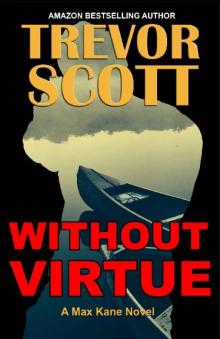 Without Virtue
Without Virtue Reaper Corps
Reaper Corps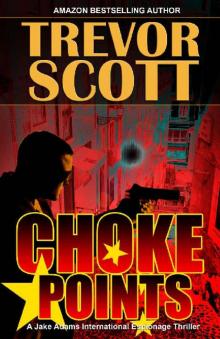 Choke Points
Choke Points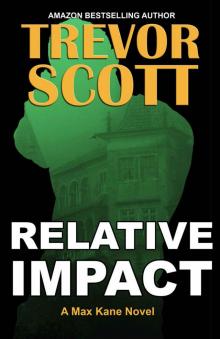 Relative Impact
Relative Impact![[Jake Adams 01.0] Fatal Network Read online](http://i1.bookreadfree.com/i/03/20/jake_adams_01_0_fatal_network_preview.jpg) [Jake Adams 01.0] Fatal Network
[Jake Adams 01.0] Fatal Network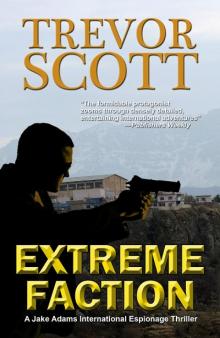 Extreme Faction
Extreme Faction The Hobgoblin of the Redwoods
The Hobgoblin of the Redwoods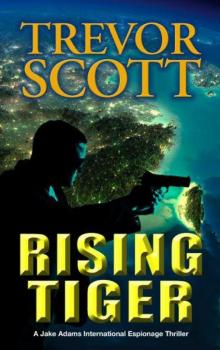 Rising Tiger
Rising Tiger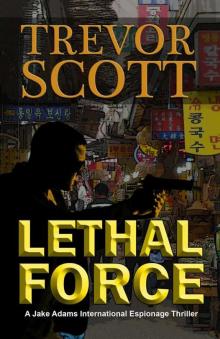 Lethal Force
Lethal Force Quantum Trigger
Quantum Trigger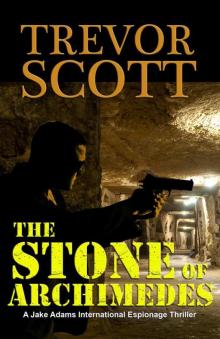 The Stone of Archimedes
The Stone of Archimedes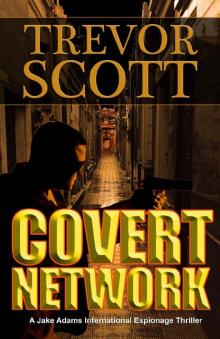 Covert Network (A Jake Adams International Espionage Thriller Series Book 14)
Covert Network (A Jake Adams International Espionage Thriller Series Book 14)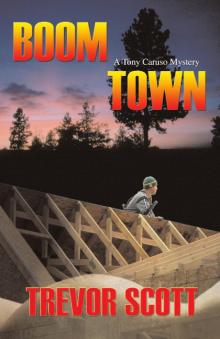 Caruso 01 - Boom Town
Caruso 01 - Boom Town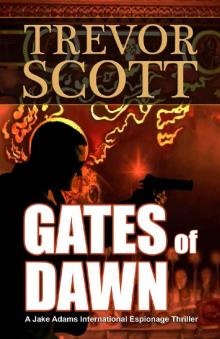 Gates of Dawn (A Jake Adams International Espionage Thriller Series Book 12)
Gates of Dawn (A Jake Adams International Espionage Thriller Series Book 12)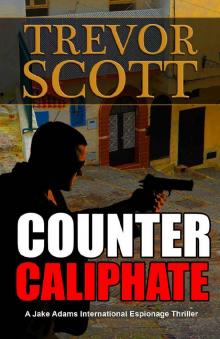 Counter Caliphate (A Jake Adams International Espionage Thriller Series Book 11)
Counter Caliphate (A Jake Adams International Espionage Thriller Series Book 11)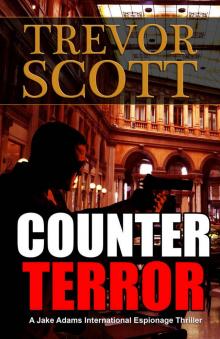 Counter Terror (A Jake Adams International Espionage Thriller Series Book 13)
Counter Terror (A Jake Adams International Espionage Thriller Series Book 13)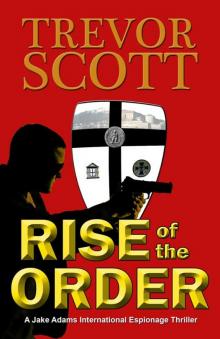 Rise of the Order
Rise of the Order Fatal Accord
Fatal Accord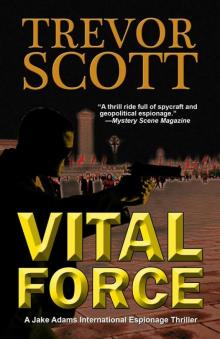 Vital Force
Vital Force Without Options
Without Options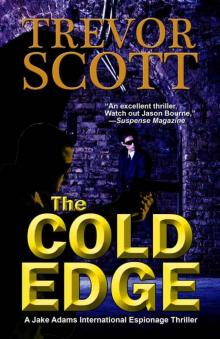 The Cold Edge
The Cold Edge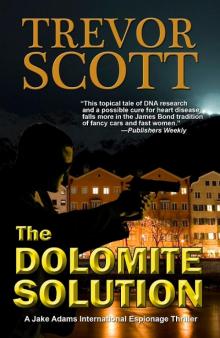 The Dolomite Solution
The Dolomite Solution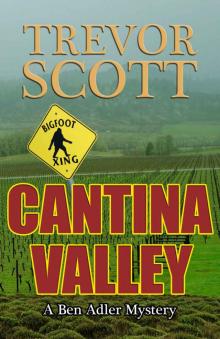 Cantina Valley (A Ben Adler Mystery Book 1)
Cantina Valley (A Ben Adler Mystery Book 1) Fatal Network
Fatal Network